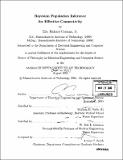Bayesian population inference for effective connectivity
Author(s)
Cosman, Eric Richard, 1977-
DownloadFull printable version (31.53Mb)
Other Contributors
Massachusetts Institute of Technology. Dept. of Electrical Engineering and Computer Science.
Advisor
William M. Wells, III and W. Eric L. Grimson.
Terms of use
Metadata
Show full item recordAbstract
A hierarchical model based on the Multivariate Autoregessive (MAR) process is proposed to jointly model functional neuroimaging time series collected from multiple subjects, and to characterize the distribution of MAR coefficients across the population from which those subjects were drawn. Thus, model-based inference about the interaction between brain regions, termed effective connectivity, may be generalized beyond those subjects studied. The posterior density of population- and subject-level connectivity parameters is estimated in a Variational Bayesian (VB) framework, and structural model parameters are chosen by the corresponding evidence criterion. The significance of resulting connectivity statistics are evaluated by permutation-based approximations to the null distribution. The method is demonstrated on simulated data and on actual multi-subject functional time series from electroencephalography (EEG) and functional magnetic resonance imaging (fMRI).
Description
Thesis (Ph. D.)--Massachusetts Institute of Technology, Dept. of Electrical Engineering and Computer Science, 2005. Includes bibliographical references (p. 157-169).
Date issued
2005Department
Massachusetts Institute of Technology. Department of Electrical Engineering and Computer SciencePublisher
Massachusetts Institute of Technology
Keywords
Electrical Engineering and Computer Science.